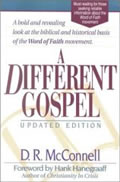Article: Keep Christianity counterfeit-free
(I thought this is quite an insightful article, which exhorts us to uphold fundamental Christian doctrines.
"If you belonged to the world, it would love you as its own. As it is, you do not belong to the world, but I have chosen you out of the world. That is why the world hates you." - John 15:19)
By the Rev. Wally Morris
Charity Baptist Church
Posted on Sat, Dec. 31, 2005
I love the end of the year. It’s hard sometimes to point out any particular reason why. It’s more than food. It’s more than gifts. The last few weeks of the year seem special. The music, the decorations and family visits all play a part.
However, I suspect that many people have lost their understanding of this time of year. They still have the good feeling, but many don’t know why they have the good feeling.
Perhaps it’s because we’re living off the interest of the Christian foundations made generations ago. Not that long ago, people in churches knew their Bible, they knew their Christianity and they understood what Christianity meant. That developed a certain way of thinking in America.
For example, Thanksgiving is a distinctly American holiday. Very few countries have Thanksgiving. It is an American holiday because of the American emphasis on religion. Many secularists will immediately object to that conclusion, yet the historically strong emphasis on the Bible in American culture and its effect on every aspect of American life is irrefutable.
After decades of a de-emphasis of the Bible in America, however, we still have the good feeling, but we’re not quite sure why we have it. And so a lot of people like Thanksgiving and Christmas, but they’re not sure why. Part of the problem can be traced to a counterfeit Christianity.
Any form of “Christianity” which denies Christianity’s fundamental doctrines is not Christianity. Doctrines such as the Trinity (three “persons” but one God), the deity and humanity of Jesus Christ (fully God and fully man), the full and complete inspiration of the 66 books of the Bible (and only those books), the Virgin Birth, the literal physical resurrection of Jesus Christ and salvation by Jesus Christ alone are a few of those fundamental doctrines.
Liberal theology, represented by the pseudo-scholarly Jesus Seminar (which was brought to Fort Wayne this year), is not Christian. J. Gresham Machen eloquently and thoroughly made this point in his book “Christianity and Liberalism” many years ago. Liberal theology is a theology of unbelief. Even a casual look at what the Jesus Seminar denies illustrates its unbelief. Liberal and Neo-orthodox theological systems are notorious for using Christian terminology with different meanings.
If a person wishes to deny fundamental Christian doctrine, that is his choice, but honesty requires that he use a word other than “Christian” to describe himself. He may have an attraction to Jesus Christ and may even believe some of what the Gospels tell us about Christ, but the Christ he follows is a Christ made in his own image rather than as the Bible portrays the Lord.
True Christianity is both doctrinally sound and practically relevant. James 1:21-27 refer to God’s Word as the “law of liberty” that frees from bondage to self only as a person is willing to see himself as the Bible pictures him. Yet true Christianity also has an “other person” focus as changed lives reach out in compassion to other people.
Liberal theology enthusiastically embraces social work and the words of Christ concerning the poor and disadvantaged, yet ignores the theological basis for any meaningful social change: the liberating gospel of the cross.
Some accuse conservative theology (fundamentalism) of neglecting society’s needs and only being concerned with the spiritual. However, many rescue missions, hospitals and charities were started by Bible-believing Christians who applied the Gospel to pressing social needs. Many evangelists were also involved in eliminating the scourge of alcohol and gambling from society. For example, in the early 1900s, when an evangelist came to town, the bars were forced to close for lack of business.
Today’s “Christianity” is an eclectic mix of Bible, psychology, motivational principles, American individualism and even some elements of Oriental mysticism.
Churches that change their format in order to be sensitive to “seekers” often have record numbers of people attend their churches, yet many churches that preach the “old rugged cross” struggle to pay their bills.
Churches that openly deny the Bible and dialogue with other beliefs are praised as “insightful” and “cutting-edge” while churches that warn about ecumenical compromise are considered “unloving” and “backward.” Pastors who smile a lot and claim they don’t know (such as Joel Osteen did this summer with Larry King) make millions of dollars on their books while other pastors who work faithfully every week to help people are considered bigoted for claiming to know the truth.
Such strange times we live in when people consider a counterfeit and superficial “Christianity” authentic, yet consider a Christianity which focuses on the cross, sin and doctrine to be a threat to society. May those churches which still preach the cross be encouraged to continue to fight the good fight of faith.
The Rev. Wally Morris is pastor of Charity Baptist Church in Huntington.
Source: Keep Christianity counterfeit-free, The Journal Gazette
"If you belonged to the world, it would love you as its own. As it is, you do not belong to the world, but I have chosen you out of the world. That is why the world hates you." - John 15:19)
By the Rev. Wally Morris
Charity Baptist Church
Posted on Sat, Dec. 31, 2005
I love the end of the year. It’s hard sometimes to point out any particular reason why. It’s more than food. It’s more than gifts. The last few weeks of the year seem special. The music, the decorations and family visits all play a part.
However, I suspect that many people have lost their understanding of this time of year. They still have the good feeling, but many don’t know why they have the good feeling.
Perhaps it’s because we’re living off the interest of the Christian foundations made generations ago. Not that long ago, people in churches knew their Bible, they knew their Christianity and they understood what Christianity meant. That developed a certain way of thinking in America.
For example, Thanksgiving is a distinctly American holiday. Very few countries have Thanksgiving. It is an American holiday because of the American emphasis on religion. Many secularists will immediately object to that conclusion, yet the historically strong emphasis on the Bible in American culture and its effect on every aspect of American life is irrefutable.
After decades of a de-emphasis of the Bible in America, however, we still have the good feeling, but we’re not quite sure why we have it. And so a lot of people like Thanksgiving and Christmas, but they’re not sure why. Part of the problem can be traced to a counterfeit Christianity.
Any form of “Christianity” which denies Christianity’s fundamental doctrines is not Christianity. Doctrines such as the Trinity (three “persons” but one God), the deity and humanity of Jesus Christ (fully God and fully man), the full and complete inspiration of the 66 books of the Bible (and only those books), the Virgin Birth, the literal physical resurrection of Jesus Christ and salvation by Jesus Christ alone are a few of those fundamental doctrines.
Liberal theology, represented by the pseudo-scholarly Jesus Seminar (which was brought to Fort Wayne this year), is not Christian. J. Gresham Machen eloquently and thoroughly made this point in his book “Christianity and Liberalism” many years ago. Liberal theology is a theology of unbelief. Even a casual look at what the Jesus Seminar denies illustrates its unbelief. Liberal and Neo-orthodox theological systems are notorious for using Christian terminology with different meanings.
If a person wishes to deny fundamental Christian doctrine, that is his choice, but honesty requires that he use a word other than “Christian” to describe himself. He may have an attraction to Jesus Christ and may even believe some of what the Gospels tell us about Christ, but the Christ he follows is a Christ made in his own image rather than as the Bible portrays the Lord.
True Christianity is both doctrinally sound and practically relevant. James 1:21-27 refer to God’s Word as the “law of liberty” that frees from bondage to self only as a person is willing to see himself as the Bible pictures him. Yet true Christianity also has an “other person” focus as changed lives reach out in compassion to other people.
Liberal theology enthusiastically embraces social work and the words of Christ concerning the poor and disadvantaged, yet ignores the theological basis for any meaningful social change: the liberating gospel of the cross.
Some accuse conservative theology (fundamentalism) of neglecting society’s needs and only being concerned with the spiritual. However, many rescue missions, hospitals and charities were started by Bible-believing Christians who applied the Gospel to pressing social needs. Many evangelists were also involved in eliminating the scourge of alcohol and gambling from society. For example, in the early 1900s, when an evangelist came to town, the bars were forced to close for lack of business.
Today’s “Christianity” is an eclectic mix of Bible, psychology, motivational principles, American individualism and even some elements of Oriental mysticism.
Churches that change their format in order to be sensitive to “seekers” often have record numbers of people attend their churches, yet many churches that preach the “old rugged cross” struggle to pay their bills.
Churches that openly deny the Bible and dialogue with other beliefs are praised as “insightful” and “cutting-edge” while churches that warn about ecumenical compromise are considered “unloving” and “backward.” Pastors who smile a lot and claim they don’t know (such as Joel Osteen did this summer with Larry King) make millions of dollars on their books while other pastors who work faithfully every week to help people are considered bigoted for claiming to know the truth.
Such strange times we live in when people consider a counterfeit and superficial “Christianity” authentic, yet consider a Christianity which focuses on the cross, sin and doctrine to be a threat to society. May those churches which still preach the cross be encouraged to continue to fight the good fight of faith.
The Rev. Wally Morris is pastor of Charity Baptist Church in Huntington.
Source: Keep Christianity counterfeit-free, The Journal Gazette








